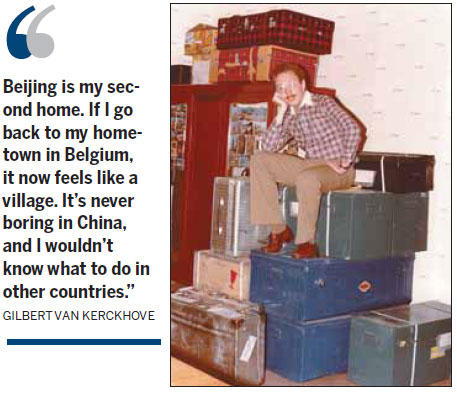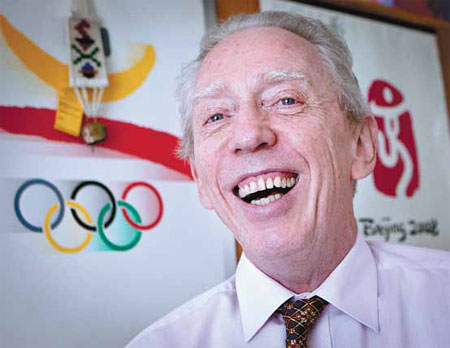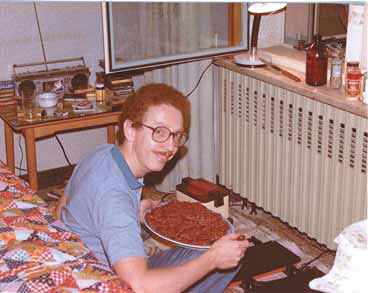Adventure advocate
Updated: 2013-05-07 07:11
By Xu Lin (China Daily)
|
||||||||
|
Gilbert van Kerckhove received the 2005 Friendship Award for bridging between the Chinese administration and foreign businesses for the Beijing Olympic Games. Kuang Linhua / China Daily |
|
Van Kerckhove held a big party inside his Beijing Hotel room in the 1980s (above). He also used his room for storing boxes for the Pingdingshan power station project. Photos Provided to China Daily |

A Belgian adventurer came to China because he first heard about the country from a Chinese tugboat worker in Nigeria, and he has come a long way since, as Xu Lin finds out.
Tall and thin, Gilbert van Kerckhove is also very talkative, a fact he readily admits. "I have a big mouth and a bit of courage," says the 64-year-old from Ghent, Belgium, grinning from ear to ear.
Thanks to that particular combination of qualities, van Kerckhove, a multi-award winner for his strategic contributions in bridging China and European countries in terms of urban constructions, says he has survived many adventures in numerous countries including Brazil and Nigeria before he came to China.
He made his first visit to China in 1980 out of his adventurous nature, but he did not expect to be "stuck in Beijing" so many decades later. It is a city he now considers home.
It was a casual conversation with a Chinese tugboat mechanic in his hotel in Nigeria in 1979 that sparked his interest in the country. So in 1980, when van Kerckhove, armed with a master's degree in electronic engineering, received an assignment to China, he took it without hesitation.
"China was quite mysterious to Westerners at that time, and all my families and friends were against my decision and said I must be crazy. But I like to embrace challenges and took the job," he says.
He was in Beijing to open the Chinese office for the Belgian company ACEC, an electrical engineering corporation which operated the Pingdingshan power station in Henan province.
The project was financed by a soft loan from the Belgian government, the first one granted to China.
The experience had allowed him to see his potential as a "matchmaker" between foreign investors and Chinese projects. In the following decades, he was involved in various large-scale construction projects including the building of Shanghai's Subway Line 3.
Exploiting his decades of experience in China, in 1999, he and his wife set up Beijing Global Strategy Consulting Co Ltd, which offers strategic guidance, investment and development advice to foreign and Chinese entities.
He has also since become a key consultant on Beijing's urban construction. His contribution to the 2008 Beijing Olympic Games is especially notable.
As a result of his close long-term cooperation with the Beijing municipal government, van Kerckhove was recommended in 2001 to participate in the preparations for the Beijing Olympic Games. He became an investment promotion delegate for Olympic projects with the Beijing Municipal Commission of Development and Reform, mainly assisting in the decisions to construct large-scale Olympic venues.
When the SARS epidemic hit Beijing in the spring of 2003, for a time, preparation meetings for the Beijing Olympic Games were even moved to van Kerckhove's home and his favorite Belgian restaurant for convenience.
Van Kerckhove calls himself a "lobbyist" for Beijing and a "bridge" between the Chinese administration and foreign businesses for the 2008 Beijing Olympic Games.
He received the 2005 Friendship Award - the highest honor for foreigners in China from the Chinese government, for his significant contributions to the Olympic Games in Beijing.
Looking back, van Kerckhove admits he had not expected to stay so long when he first arrived. In the early 1980s, China was a different country, van Kerckhove says. Life was both exciting and restrictive for a foreigner.
Foreigners were only allowed to stay in hotels, and van Kerckhove used his Beijing Hotel room as an office and the occasional party space.
He remembers the come-and-go of cargos for the Pingdingshan project which filled his room with piles of boxes. He remembers the mouth-watering smell of grilling hamburgers, which was not allowed in the room but which he and some friends had sneakily done from time to time.
Last but not least, he remembers the grand view of the Forbidden City from the window of his hotel room, which made the hotel-room-office unparalleled.
Not even his current three-story home office in downtown Beijing can have the same vista.
He found it difficult to endure the monotonous life outside work. There were few places open to foreigners, apart from Wangfujing Street and the Friendship Store, reserved exclusively for foreigners.
Fortunately, he renewed his acquaintance with the tugboat mechanic he met in Nigeria, and through this Chinese networking, he was introduced to other Chinese friends in Beijing. It came full cycle when he met Sun Bing, to whom he is now happily married.
It was a very typical introduction. His friends had asked him to find a boyfriend for Sun, who couldn't speak English and had to use a small dictionary to communicate with him.
As an innocent foreigner, he was the last to realize that they were setting him up for a date.
His friends all had a good laugh after he was married, often joking about the first dinner date where the main dish was buffalo penis in hot sauce.
Now happily living in Beijing with his wife and daughter Valerie, van Kerckhove says he has no intention to leave despite the air pollution that has caused many expatriates to have second thoughts.
"There are problems here but Beijing's a very unique place," says van Kerckhove, adding that he loves Beijing because of its culture.
As the only foreigner among the committee members of the Specialist Working Group for the Beijing 12th Five Year Plan, van Kerckhove has used his position to counsel improvements to the city's urban traffic and environment, "because you feel part of this country somehow, and you'd like to contribute".
Some of his recommendations have been implemented, for example, the promotion of electric vehicles usage and the increase of bike lanes and parking lots.
"Beijing is my second home. If I go back to my hometown in Belgium, it now feels like a village. It's never boring in China, and I wouldn't know what to do in other countries," he says.
Contact the writer at xulin@chinadaily.com.cn.
(China Daily 05/07/2013 page18)

 Michelle lays roses at site along Berlin Wall
Michelle lays roses at site along Berlin Wall
 Historic space lecture in Tiangong-1 commences
Historic space lecture in Tiangong-1 commences
 'Sopranos' Star James Gandolfini dead at 51
'Sopranos' Star James Gandolfini dead at 51
 UN: Number of refugees hits 18-year high
UN: Number of refugees hits 18-year high
 Slide: Jet exercises from aircraft carrier
Slide: Jet exercises from aircraft carrier
 Talks establish fishery hotline
Talks establish fishery hotline
 Foreign buyers eye Chinese drones
Foreign buyers eye Chinese drones
 UN chief hails China's peacekeepers
UN chief hails China's peacekeepers
Most Viewed
Editor's Picks

|

|

|

|

|

|
Today's Top News
Shenzhou X astronaut gives lecture today
US told to reassess duties on Chinese paper
Chinese seek greater share of satellite market
Russia rejects Obama's nuke cut proposal
US immigration bill sees Senate breakthrough
Brazilian cities revoke fare hikes
Moody's warns on China's local govt debt
Air quality in major cities drops in May
US Weekly

|

|









